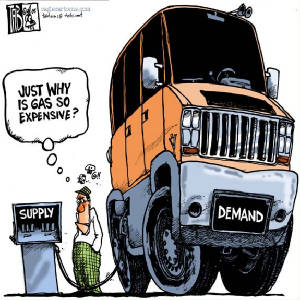
Oil probably should be as expensive as it is, whether you buy gasoline, petrol or diesel. But the price should be paying for the pollution and opportunity cost, not profits of executives working for big oil.
So, this article from REpedia caught my eye:
The Oil Industry’s Monopoly on Transportation
Once again, high gas prices are draining our wallets and making us crazy.
What to do?
We’ve drilled, baby, we’ve drilled. We’re now drilling more in this country than we have in nearly a decade.
We’ve given tax breaks and other wasteful incentives to oil companies to try and ease our pain at the pump. We now give about $4 billion in tax breaks to the oil and gas industry each and every year.
We’ve listened to naysayers tell us that pursuing clean energy alternatives to oil and gas is a waste of our time and money. Now, the United States is lagging much of the rest of the world on clean energy.
And what have we gotten in return?
Gas prices that are hitting new highs, an economy held hostage to global instability and an oil industry monopoly on our transportation system.
There’s nothing we can do to control the price of gas in America, because oil prices are set on a global marketplace. As we’ve seen, more drilling certainly isn’t the answer, because that’s done nothing to reduce prices at the pump. The only thing more drilling has done is increase profits for oil companies – to the tune of $137 billion last year alone, a 75 percent rise since the year before. Who else got a 75 percent raise in the middle of a recession?
The fact is, the only way we can reduce how much we spend on gasoline is to reduce how much gasoline we use.
We Need More Choice In Transportation
Our fundamental problem surrounding gas prices is a lack of choice.
Right now, with few exceptions, we must all fill our cars with gasoline. If we don’t like it, too bad.
Right now the average U.S. household buys more than 1,100 gallons of gas per year. At $4 per gallon, that means the average household spends $4,400 per year just on gasoline
More efficient vehicles could help dramatically. Hybrid vehicles can cost about half as much to operate as conventional vehicles. New fuel economy standards that take effect this year can deliver thousands of dollars in gas savings to Americans who can afford new cars. By 2025, the new 54.5 miles per gallon fuel standard will save consumers $4,400 over the lifetime of their vehicle. By 2030, the United States could save $200 billion as a result of the new standards.
New choices for fuel can help too. Electric vehicles now on the market, for example, can cost the equivalent of $1 per gallon at today’s average electricity prices.
Americans who have the choice of walking, biking, taking public transportation, or telecommuting to work can skip trips to the gas pump altogether. According to a new report, switching to public transportation would save the average driver a whopping $10,120 a year.
Here’s the problem though: Not all Americans have these choices. Many of us have no other choice than to drive to work, and pay out the nose for gasoline to do it.
We Need Policies That Give Americans More Transportation Choices
Instead of continuing to give tax breaks to oil companies, why not channel that money to consumers to help buy more efficient vehicles or to fund research to build even better vehicles?
Instead of cutting public transit funding, why not invest in mass transit to make it more accessible to more Americans?
Instead of keeping ourselves captive to a single fuel choice — oil — why not help give Americans more choices, with policies that support vehicles that run on electricity or cellulosic biofuels that don’t deplete food stocks or degrade the environment.
Instead of eliminate programs that encourage biking, walking and sustainable real estate development, why not do more to foster these gas-saving alternatives?
Watch the video below for more background on how to break the oil industry’s monopoly on our transportation system — and how we can fuel our future beyond oil.

Comments